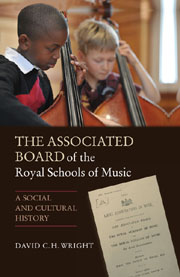Book contents
- Frontmatter
- Contents
- List of Illustrations
- List of Tables
- Dedication
- Preface
- List of Abbreviations
- Miscellaneous Conventions
- Introduction: The Context for a History
- I THE BACKGROUND
- II THE BOARD ESTABLISHED, 1889–1920
- III THE INSTITUTIONAL CULTURE, 1920–83
- 6 The Inter-War Years
- 7 The Board in Wartime
- 8 The Post-War Board
- 9 Too Much Success: the 1960s and 1970s
- IV THE BOARD REVIVED, 1983–2009
- Appendix 1 Speech and Drama Examinations
- Appendix 2 ABRSM Personalia, 1889–2010
- Select Bibliography
- Index
7 - The Board in Wartime
from III - THE INSTITUTIONAL CULTURE, 1920–83
Published online by Cambridge University Press: 05 July 2013
- Frontmatter
- Contents
- List of Illustrations
- List of Tables
- Dedication
- Preface
- List of Abbreviations
- Miscellaneous Conventions
- Introduction: The Context for a History
- I THE BACKGROUND
- II THE BOARD ESTABLISHED, 1889–1920
- III THE INSTITUTIONAL CULTURE, 1920–83
- 6 The Inter-War Years
- 7 The Board in Wartime
- 8 The Post-War Board
- 9 Too Much Success: the 1960s and 1970s
- IV THE BOARD REVIVED, 1983–2009
- Appendix 1 Speech and Drama Examinations
- Appendix 2 ABRSM Personalia, 1889–2010
- Select Bibliography
- Index
Summary
Maintaining the exams
THE Second World War put considerable pressure on the Board's capacity to maintain its examining. As Table 7.1 shows, there was an astonishing 64% increase in the number of entries by the end of the war as people returned to peacetime life. The war involved the civilian population very directly. Disruption of the railway network, fuel shortages and the heavy German bombing of major urban centres caused considerable logistical dislocation, quite apart from the constant danger to civilians. So the determination of teachers, candidates and examiners from the very outset to continue the exams as far as was possible can be seen as an example of the British wartime spirit. The issues of sending examiners abroad also put the Board under very great difficulty. The continuation of overseas examining was indicative of the importance felt in maintaining cultural links between the home country and the rest of the British World during the conflict.
The Board began its planning for the war by constructing an air raid shelter in the basement of 15 Bedford Square and moving some of its records and stationery to the RCM so that it could work from there if Bedford Square was hit. The Board feared that the initial fall-off in candidates (see Table 7.1) would set the trend for the war, and so it moved swiftly to reduce examiners’ fees and allowances in order to bolster the financial position.
- Type
- Chapter
- Information
- The Associated Board of the Royal Schools of MusicA Social and Cultural History, pp. 129 - 134Publisher: Boydell & BrewerPrint publication year: 2013



